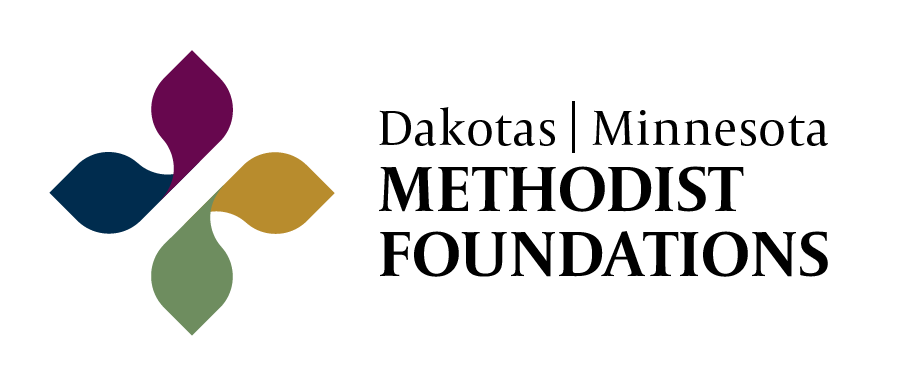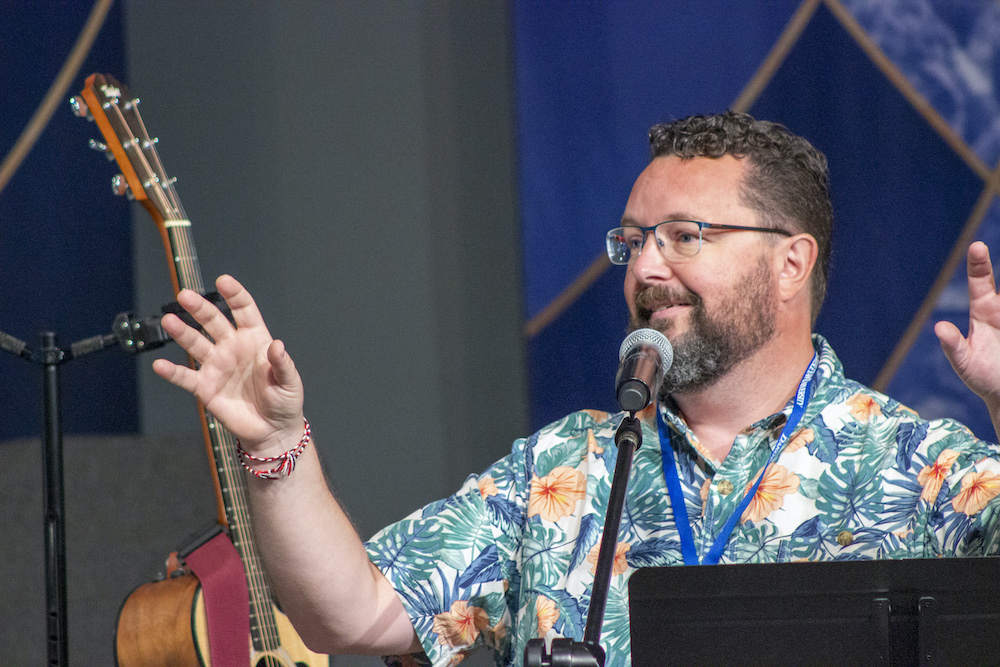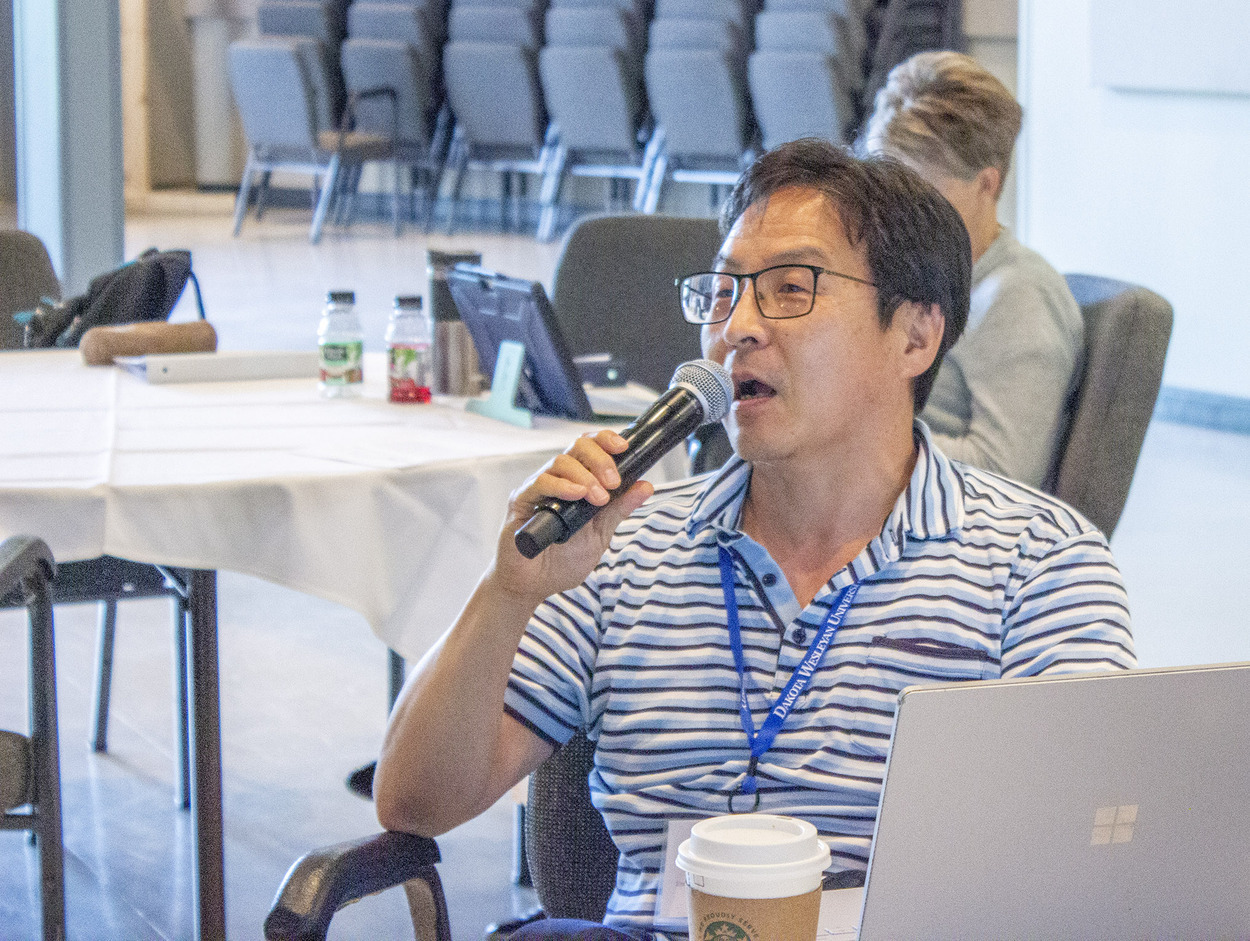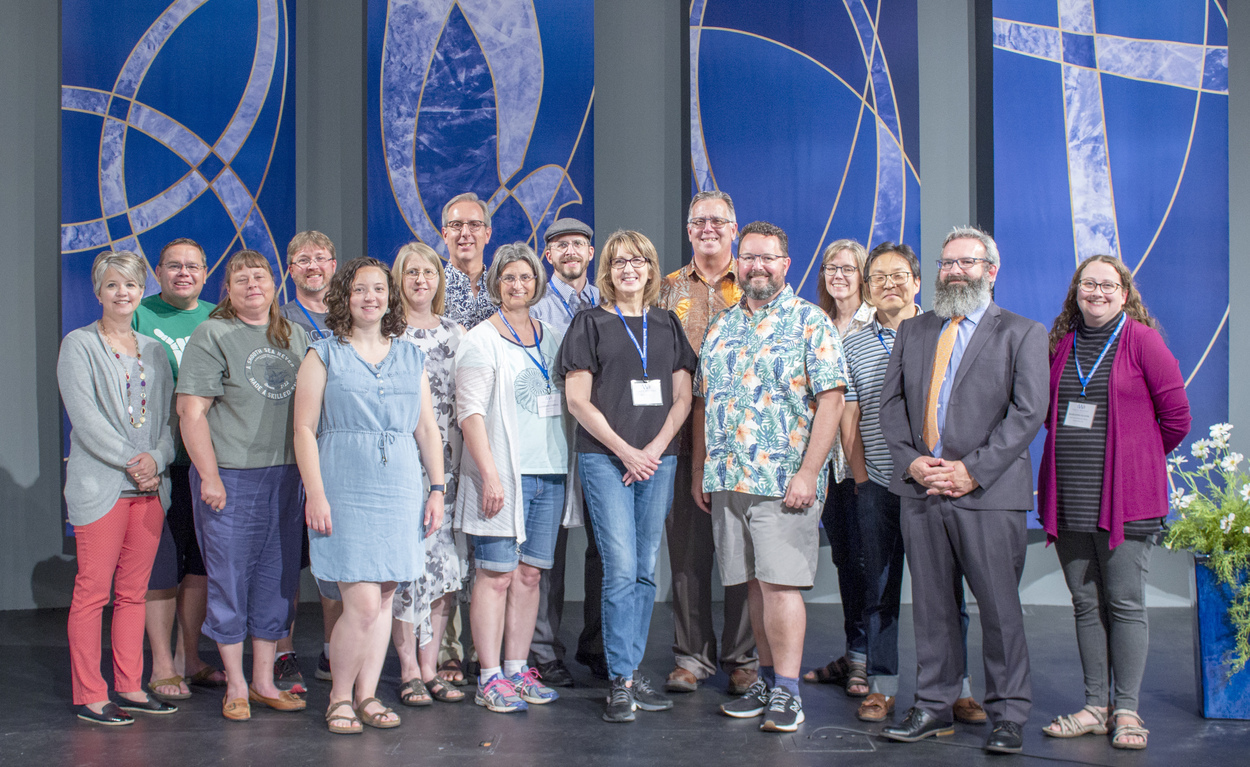
11 area clergy complete Nonprofit Church Leadership Program, 7 more begin

Rev. Cory Thrall addresses a gathering of graduates and enrollees at a combined Nonprofit Church Leadership gathering on July 13, 2021 on the campus of Dakota Wesleyan University in Mitchell, South Dakota. Photos by Dave Stucke, Dakotas Conference Communications.
Rev. Cory Thrall used to be uncomfortable with discussions about giving and fundraising. He’s done sermon series on giving and led annual stewardship drives, but he didn’t enjoy those experiences.
Enter the Nonprofit Church Leadership Program (NPCL), a graduate-level certificate program at Dakota Wesleyan University in Mitchell, South Dakota. The year-long experience changed his thinking about generosity and stewardship and has given him confidence in addressing these important topics within the life of his church, multi-site Legacy UMC in Bismarck, North Dakota.
“The class on fundraising helped me in knowing how to ask for funds, what to do when someone gives a large gift, and how to move a congregation from thinking that ‘all the church wants is money’ to a place of ‘I am going to give because it is sign of spiritual growth and trust in God,’” said Thrall. “I moved from being uncomfortable to comfortable…I am a more effective leader because of NPCL.”
Strengthening skills to lead today’s church
Five Dakotas and six Minnesota United Methodist clergy just completed the NPCL, which taught them about stewardship of financial resources, human resources, vision, strategy, community, and communications—and seven more area clergy are about to begin the program, along with 10 United Methodist clergy from the Michigan Conference and several Lutheran pastors.
The program, which launched in 2018, is a partnership between the Dakotas-Minnesota Area of the United Methodist Church and Dakota Wesleyan University, with funding assistance from the Lilly Endowment. Those entering the program this summer represent the fourth cohort of clergy participants. Over the past four years, more than 60 congregations have benefited from their clergy participating in the program and gaining new skills.
In addition to Thrall, this year’s other Dakotas Conference graduates are Revs. Jenene Earl and Valerie Hummel LaBounty, and camp directors Christy Heflin and Lara Ziegler.
The online program, which includes some live lectures, is designed to enhance the administrative and management skills of church leaders. It strengthens the competencies that pastors need to lead today's church but perhaps did not obtain during their undergraduate, graduate, or seminary education.
“I appreciated the fact that the program gave me really good skills and that I was able to apply that knowledge with a lot more love and context than what an external consultant could offer,” said Rev. Ruth Ann Ramstad, who serves Brunswick UMC in Crystal, Minnesota. Rather than providing answers in the form of a one-size-fits-all approach, the instructors provided a whole menu of options that might be helpful to various congregations based on their size, setting, and particular makeup. Ramstad also found the individual coaching to be hugely valuable.
Projects benefit local churches

A participant in last year's NPCL cohort presents his final project in the Wagner Chapel at Dakota Wesleyan University on July 13, 2021.
Over the course of the year, each student completes two applied projects, each of which focuses on an area of need within the participant’s local church.
One of Thrall’s projects came from noticing that all three of Legacy’s sites were missing people from the 18-30 age group. He created a digital “fourth church” that’s open 24/7 and focuses on intentional interaction every day, not just on Sunday mornings. Called Missouri Valley Community, it has prayer times, teaching moments, simple interactive questions, praise music, and condensed sermons.
Ramstad, meanwhile, focused one of her applied projects on creating a plan to make better use of the church building in order to both enhance existing community partnerships and generate income to help the church pay for the cost to run the facility.
“It was a plan for restructuring the governance of the church so we’re in the best possible position to have positive and paying partners that share our facility and do our work with us,” she said.
Part of the project involved hearing from a large number of the church’s laity, who articulated and expanded upon Brunswick’s mission—and, to Ramstad’s delight, truly owned that mission.
“The biggest thing the program did was confirm for me and for my church that we’re not just on some dream boat; we have a specific, researched, credible plan for the future that is reliable, stable, and sustainable.”
Incoming cohort ready to learn
The clergy beginning the program this month say they are eager to acquire new skills and sharpen others.

Woojae Im, UMC clergy from Richfield, Minnesota, asks a question after a participant has presented their final project to the NPCL cohort via videoconference on July 13, 2021.
“In this ever-changing ministry environment, we can’t settle for the ways we did ministry decades ago,” said Rev. Woojae Im, who serves Church of Peace in Richfield, Minnesota. “All the training I have had in the past had to do with theology, biblical studies, and/or spirituality. I have never learned ways to do ministry through the lens of a business model, which attracts me to this program.”
Im is particularly excited to learn how to effectively lead change within a church setting, knowing that it’s often difficult for people and met with resistance.
Meanwhile, Jeff Pospisil, the Dakotas Conference executive director of finance and administration, is looking forward to growing in his leadership—especially as it relates to the teams he works with: Trustees, Council on Finance and Administration, Board of Pensions, and Human Resources. “Sometimes you get used to being the answers person,” he said. “I’d like to be better at working with staff and volunteers and finding answers with them.”

The incoming and the graduating students of the NPCL are pictured on July 13, 2021, in the Sherman Center on the campus of DWU, in Mitchell, South Dakota.
Pospisil also looks forward to gaining a more thorough understanding of what church leaders are struggling with when it comes to finance and stewardship so he’s better able to equip them to address those issues in their congregational settings.
What Thrall would say to the incoming cohort and those considering this program in the future: “It will be work but worth every moment that you put into it,” he said. “Leading well is so much more than charging up a hill with a great idea and hoping that people are following behind you. Leading actually means closing your mouth more than you open it. One of the most important lessons I learned about leadership is to seek to understand more than to be understood.”